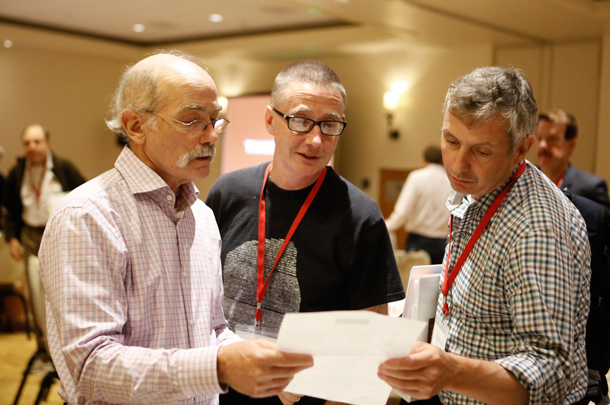Seeking to strengthen partnerships between two of USC’s oldest schools, scientists from the Keck School of Medicine of USC and USC Dornsife College of Letters, Arts and Sciences recently gathered to discuss new research and areas for future collaboration.
The Keck-Dornsife Research Retreat was held Oct. 1-2 at Terranea Resort in Rancho Palos Verdes. The retreat featured about 54 scientists and faculty members from the two schools.
“This is great science,” said Thomas Buchanan, MD, vice dean for research at the Keck School of Medicine, at the opening of the two-day event. “The fundamental idea of this retreat is to build basic scientific collaboration between the two schools. We don’t want to leave here without concrete plans for the future.”
The opening day of the retreat featured a “lighting round” — scientists detailing their research in short, dynamic presentations. The second day featured sessions on research collaborations between the two schools, partnerships with industry, core resources and joint training opportunities.
The retreat was hosted by Carmen A. Puliafito, MD, MBA, dean of the Keck School of Medicine and Randolph Hall, PhD, vice president of research at USC.
Paul Aisen, MD, director of the Alzheimer’s Therapeutic Research Institute, was the retreat’s keynote speaker.
Departments and institutes represented included the USC Mark and Mary Stevens Neuroimaging and Informatics Institute, biological sciences, cell and neurobiology, chemistry, molecular biology and immunology, oncology and stem cell biology and regenerative medicine.
Among the researchers presenting their work was Janos Peti-Peterdi, a professor in the Department of Physiology and Biophysics at the Zilkha Neurogenetic Institute within the Keck School of Medicine of USC. Peti-Peterdi’s research focuses on renal pathophysiology.
“Kidney disease is a major health problem and kidney research is a top priority for USC,” Peti-Peterdi said. “As our kidney team becomes larger, we seek opportunities to collaborate and interact with researchers across the university with the goal of finding a cure for chronic kidney disease.”
— Douglas Morino


